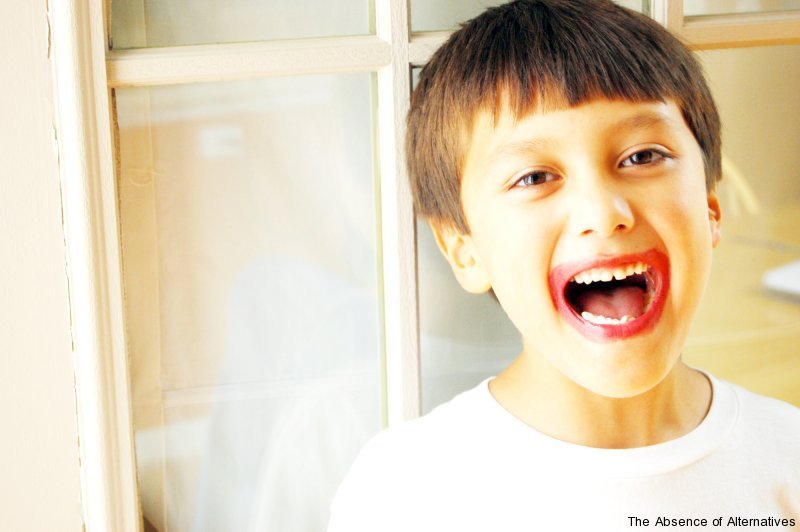As much as I lament the lack of girl presence in my household, I know I am blessed to have my boys. They tug at my heart even though they bruise my sides sometimes when they roughhouse; They have no control over and are unaware of their own growing limbs. They are protective of their mother even though I am often the butt of the joke made by them. (“Ha ha. You said Butt!”) They crack me up with their antics even though at least once every day I have to use my most unpleasant voice in order to be heard.
I am a tomboy. Magenta makes me physically ill. I am scared of dolls. It is probably for the better that I do not have girls. (I know I am committing gender stereotyping here. Guilty as charged.) On the other hand, what do I know about boys that equips me with the wisdom and strength to bring them up to become upstanding world citizens?
I know there are many excellent books out there on how to raise boys so they become well-adjusted, whole persons. Raising Cain: Protecting the Emotional Life of Boys, as has been recommended to me when the kids were little, is one of them. I have to admit though, I haven’t read any of these books. I am wary of reading parenting books. It’s probably the aftermath from reading dozens of books trying to teach me the right way to get my babies to sleep through the night and every single one of them failing me. Unfair judgement and gross generalization? Probably so.
That being said, the title of the book Protecting the Emotional Life of Boys has been on my mind ever since I heard about it.
First of all, the title itself is misleading: Not only do we need to make sure we construct an emotional life for them, afterwards, we also need to make sure to nurture and protect it. The premise of the book is that boys have been pressured by this society to be isolated from their emotions, and that it is becoming more and more important, with the increasing violence committed by young men to their peers in mind, to provide our sons with a well-rounded emotional education, to allow them to learn a vocabulary of emotions to express themselves.
As much as I agree with the above statement, the way I see it, this book, and all the other books, failed to ask the first question:
WHY does the emotional life of our boys need to be protected? What does it say about the society we live in?
We need to protect the emotional life of our sons because this society we are bringing them up in is obsessed with an uber macho image of itself. Instead of challenging the hegemony, they simply took it as a given.
Frankly I am tired of this bullshit. This cliche. What defines a man in this country.
We have never told the boys to stop crying because they are boys.
We encourage reading and writing. The appreciation of arts and music.
We allow them to like and own cute stuff. (Thank you to Japanese pop culture which provides ample supplies of cute imagery and items that do not churn one’s stomach).
We allow Mr. Monk to declare that his favorite color is pink. And then purple.
We allow loving rainbows.
We still snuggle with the boys now that they are no longer toddlers.
We have always engaged in frank conversations about our emotions with the boys.
We tell them we love them every single day.
We don’t watch sports on the weekend.
We don’t push them to go outside and play ball with the neighborhood boys.
My husband does not go fishing.
My boys do not play any ball-related sports.
They watched and LOVED ice dancing, realizing what an athletic accomplishment it was.
My oldest is in competitive gymnastics, a sport, frankly, as athletic as it gets, and yet, he gets teased by girls for doing a “girls’ sport”. (Fortunately we have managed to provide him with a well-rounded emotional life that he does not care…)
I know we are considered to be “odd” in the neighborhood, our being an interracial couple aside.
Once when a neighbor dad invited Mr. Monk to his backyard to play football (or some other ball) with all the other boys, Mr. Monk looked him straight in the eye and declared, “I don’t like sports.” He turned around, walked away, and then stooped to pick up a dandelion. The poor man looked dumbfounded. I didn’t allow him a chance to show me his “sympathy”. “I don’t like sports either.” I said nonchalantly as I walked away.
I am tired of how all these experts failed to question what’s defined as properly masculine in the US society.
Why doesn’t anybody wonder WHY it is perfectly okay for a man, any man, say, to wear pink, carry a purse, comb your hair in a European and Asian society? And yet it is a NO NO here in the US of A?
What happened in the relatively short history of the forming of this country that caused this? Surely Andrew Jackson could not have done this single-handedly. Could he?
With this thorn on my back, you could imagine my excitement when I came across a book called Boyhoods: Rethinking Masculinities. Oh Boy, was I ever! Especially since it has the endorsement of Judith Butler and Tony Kushner, I couldn’t wait to read some scathing argument against the preconceived notion of masculinity and perhaps there would be some explanation on why the American society is so distinct in its homophobic tendency. Yes, it is homophobia, hand in hand with this cultural obsession with machismo. Our men are so concerned with NOT being labeled as gay that they would go to great length to prove otherwise.
I was disappointed yet again.
The author basically preaches the concept that it is ok for boys to behave feminine since some of them do. And it is ok if they are gay since most of the feminine ones turn out to be.
While I agree with 75% of the statement above, I take issue with this automatic equation between Feminine Boys = Gay
Before I go on further, please allow me to invoke “The Seinfeld Disclaimer” first: “Not that there is anything wrong with that!”
The “feminine” tendencies as identified in the book did not trigger my “OMG something is wrong with my kids”-dar at all. Perhaps because I did not grow up in this country and of course, I am not male, I do not have all these nerve endings that automatically warn me against what will inadvertently be taken as “inappropriate boy behavior”. To me, things such as “dislike for sports”, instead of being a label for femininity, should be counted towards individualities and personal quirks.
Who defines what is considered feminine vs. masculine? I am not so progressive as to suggest that donning a woman’s dress is not sufficient enough to identify a male person as “against the norm”. However “simple matters” such as the preference of certain colors (pink), activities (knitting, cooking, arts & crafts) and companions (little boys liking to play house, or other quieter play in general, with little girls) as “signifiers”? We need to stand up and cry foul. The arbitrary, rigid line needs to be challenged.
I try. As they grow older, especially as my first born looking towards entering Middle School after the summer, I fear I may be fighting a losing battle. Soon, as dictated by the reality called Living in the USA, I will need to gear up to protect his emotional life for him as he slips further and further away from his emotional self so that he could be strong enough to face his reality called School Yard.

















